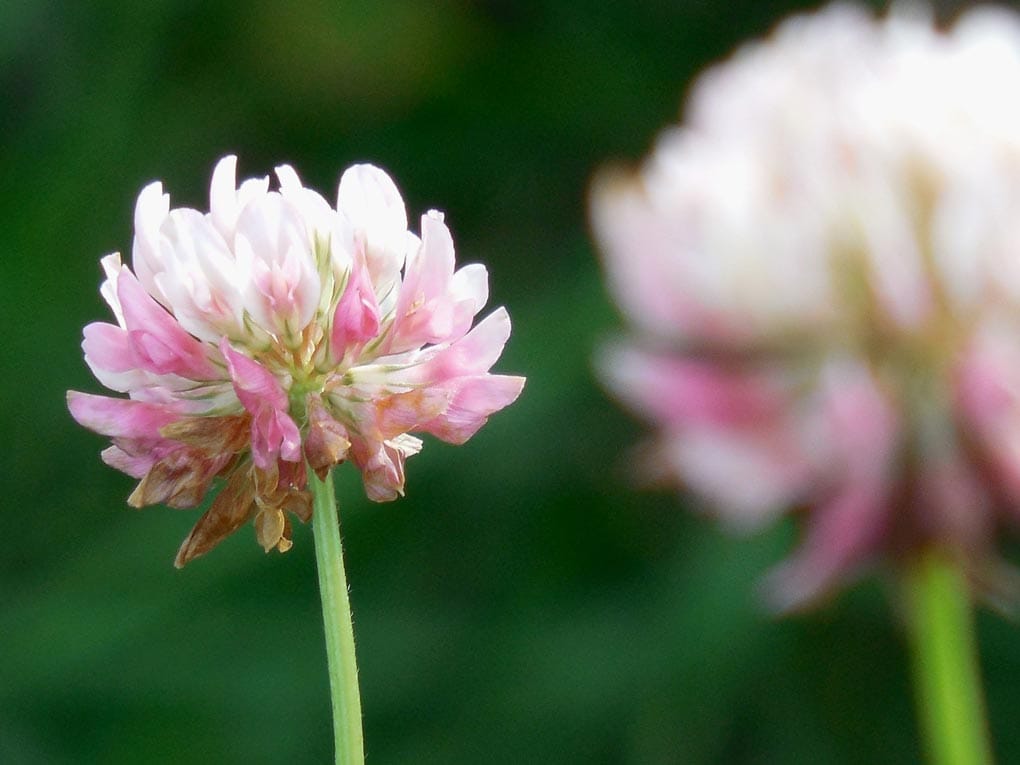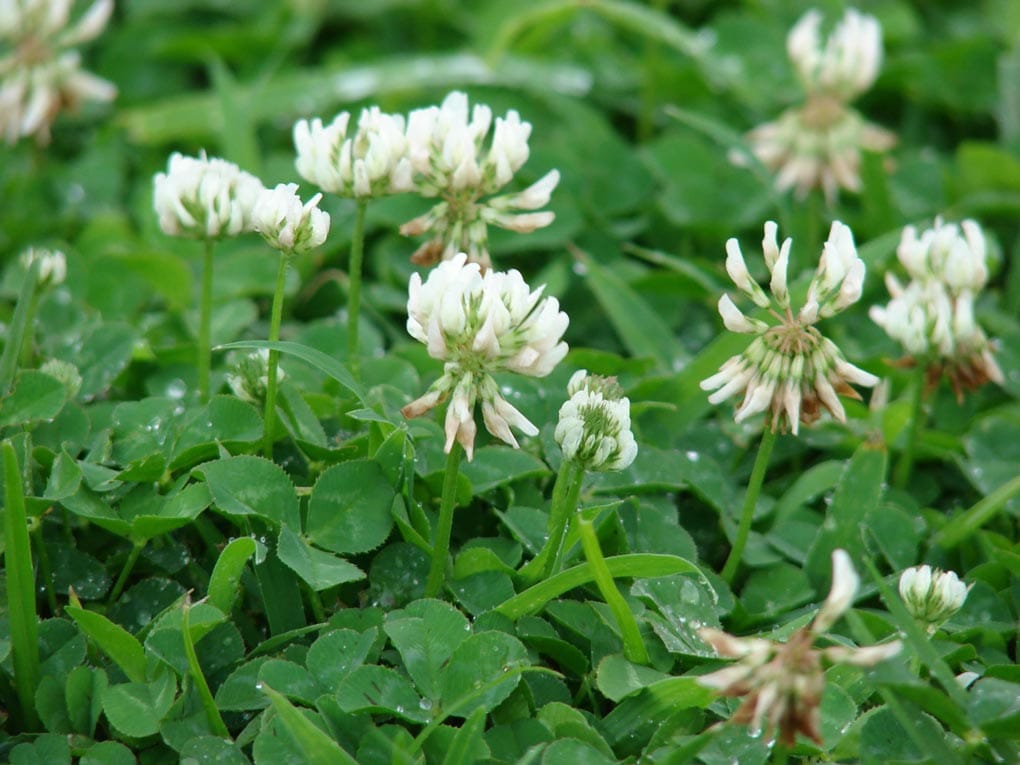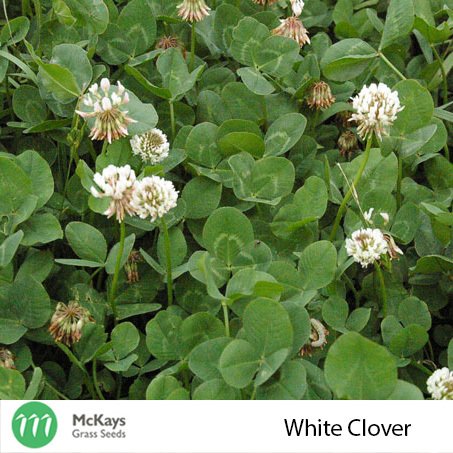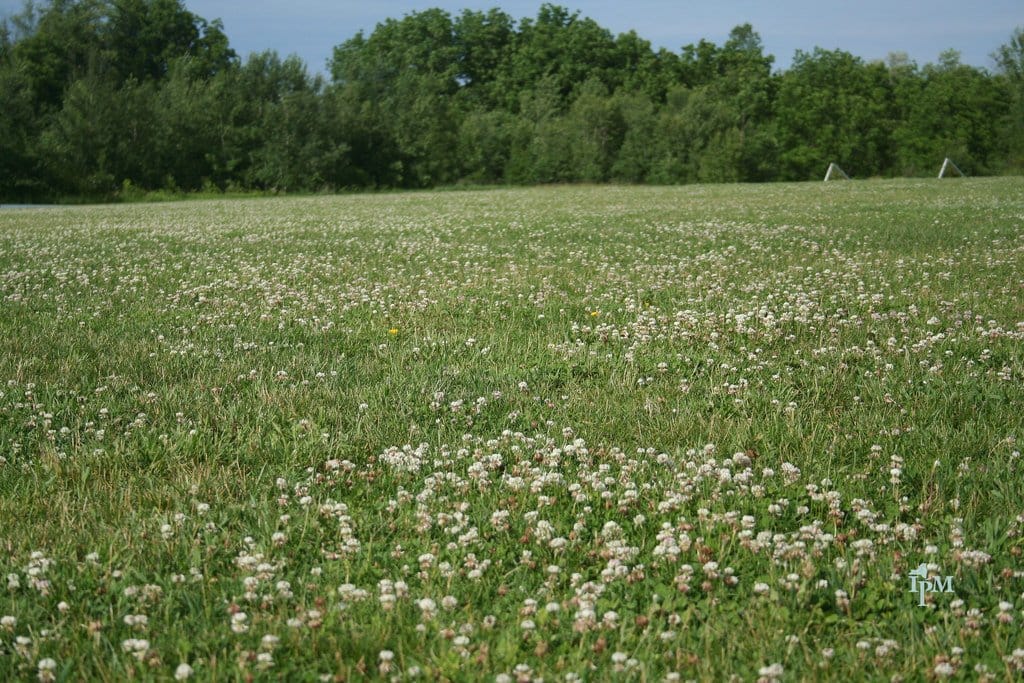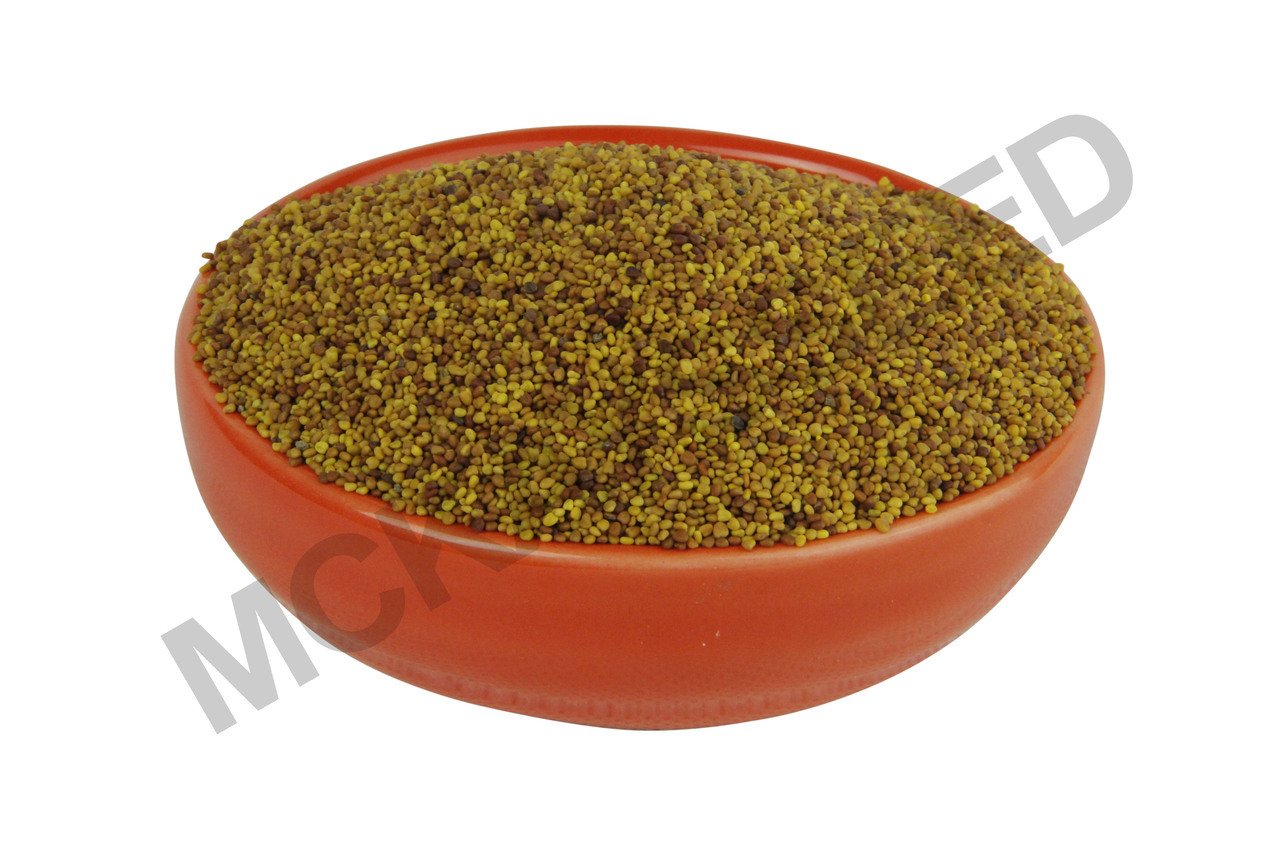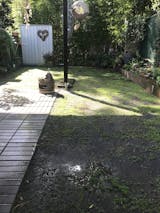White Clover
White Clover (Trifolium Repens) is commonly used as a cold season pasture plant or forage crop. It has been described as the most important forage legume of the Temperate zones of Australia. It provides good levels of Autumn and Winter forage production, particularly when grown in mixtures with forage grasses, such as Perennial Ryegrass. It has a large 3-leaflet green leaf and white (or sometimes yellow/pink) flowers with globular heads.
A perennial legume, White Clover is known to produce high yields for feed crops and is resistant to many adverse conditions. Its properties also lend it to being an excellent “living mulch” for vegetable gardens, vineyards, and orchards. As a leguminous and hardy plant, it is considered to be a beneficial component of natural or organic pasture management and lawn care due to its ability to reduce nitrogen leaching from the soil and out-compete weeds. For these reasons, it is often used as a green manure and cover crop.
White Clover is a popular choice for attracting Bees and has long been the leading honey plant sought by Bee Keepers. Bees love White Clover flowers for both the pollen and nectar. People who grow fruit trees or plants which rely on bees for pollination may find that the presence of White Clover is beneficial for improving this process.
White Clover grows well as a companion plant among lawns, grain crops, pasture grasses and vegetable rows. It is able to grow and provide green cover in poorer soils where turf grasses do not perform well. Whether planted purely as a White Clover pasture or as part of a mixture of seed varieties, your land and your stock can benefit from the addition of this hardy legume.
Seeding rates:
- Lawns: 10 grams per square meter (1kg/100m2).
- Pasture: 1kg per square acre.
Please note: This seed may be coated in Prillcote seed treatment. Batches may vary.
For more information see below for Description and Features to see if this grass suits you!
Description
White Clover, otherwise known as Trifolium Repens derives its name from the Latin tres, “three”, and folium, “leaf”, so called from the characteristic form of the leaf, which usually but not always has three leaflets. The species name, Repens, is Latin for “creeping”. White Clover is a legume native to Europe and central Asia.
See our White Clover: Quick and Comprehensive Guide for further information.
Optimal pH: Clovers are known to tolerate acidic soils, but White Clover prefers soils with a pH between 5.8 – 7.0. It can grow in many different types of soil, although it prefers clay soils.
Sowing Tips: Ideally, sow seed into soft top soil or sandy loam. Broadcast the seed at, or very near, the soil surface and incorporate lightly with raking. To ensure best coverage and avoid seed wastage we recommend using an appropriate seed spreader for the size of your area. Soil must remain damp throughout the germination period of both seeds and must be maintained for at least 1-2 weeks after sowing, through irrigation or natural rainfall.
Optimal Planting Time: Mid-Autumn to early Winter in moist conditions. If irrigated, can be planted in Spring.
Germination: 7-14 days, climate and condition dependent.
Water: White Clover needs moisture. It doesn’t tolerate drought conditions very well and needs summer rain or irrigation to thrive. It has the ability to tolerate some waterlogging.
Fertilising: Whilst it will grow more successfully in infertile conditions than other plants, it will not grow without a decent level of phosphorus in the soil. Luckily, this can be solved with by using McKays Slow Release Fertiliser.
First Mowing: Once roots are established enough to withstand the mowing process.
Mowing Frequency: White Clover can tolerate close mowing and grazing.
Disadvantages of White Clover:
- White Clover can spread into unwanted areas such as lawns through lawn clippings and seeds, as well as via the running stems (stolons) which propagate new plants.
- White Clover needs moisture. It doesn’t tolerate drought conditions very well and needs summer rain or irrigation to thrive.
- Whilst it will grow more successfully in infertile conditions than other plants, it will not grow without a decent level of phosphorus in the soil. Luckily, this can be solved with some simple fertilising.
- White Clover is relatively resistant to leaf diseases but can be prone to root or stolon rot in adverse conditions. Build-up of vegetation on aged stems and stolons can lead to susceptibility to developing disease and insect problems. However, regular cutting or grazing encourages new plant growth and removes this risk. In a pasture or a well maintained living mulch, risk of diseases and pests is low.
- For more details see our article The Pros and Cons of growing White Clover
Seed & package details: 100% White Clover Seed.
Ideal Usage: Lawn, Pasture Crop, Nitrogen Fixation, Attracting Bees.
NOTE: Pasture Seed and Animal Health
When purchasing seeds through McKays Grass Seeds, the buyer acknowledges that McKays Grass Seeds is not liable for any animal health issues that may arise from our pasture seeds.
It is the buyers responsibility to contact a certified agronomist to ensure they are purchasing the correct seeds, in the correct quantities for their property, location and animals.
Where can I sow this grass in Australia? Areas: 4, 5, 6, 7, 8, 9
Shade tolerance: Good
Daily Sunlight required: 4+ hours
Drought tolerance: Good
Frost Resistance: Excellent
Traffic Tolerance: Moderate
Locations

Season
Warm season grasses thrive during the warmer months in Spring and Summer and may go dormant in cooler climates through winter.
Cool season grasses thrive during the cooler months in Winter
Seed information
Shade tolerance (Weather)
- Full Sun
- Part Shade
- Heavy Shade
- Full Shade
Drought tolerance (Weather)
- Moderate
- Good
- Excellent
Traffic tolerance (Weather)
- Moderate
- Good
- Excellent
Frost tolerance
- Poor
- Moderate
- Good
- Excellent
Average days to germination
- 2-3 Weeks
- 2-4 Weeks
- 3-4 Weeks
Free Metro Shipping On All Orders Over $75
We provide free standard delivery shipping for all orders to "metro" zones, where the total cart value exceeds $75.00.
Otherwise, to metro zones it's a flat rate of $9 (for orders under $75).
Non-Metro Zones
Standard Delivery
Australia Wide (except Western Australia), at cost from Australia Post.
Orders are dispatched within 24 hours via regular Australia Post (3-5 business days).
Express Post
In a hurry? Express shipping is available at checkout for both Metro and Non-Metro Zones. Priced according to shipment weight.
WA Customers
Due to quarantine restrictions, we have a different product range available for Western Australia.
If you are shopping for delivery to WA, please view our WA site here
Pick-up Not Available
Sorry, we are not able to offer local pick-up.
International
Unfortunately we are not able to ship internationally.


